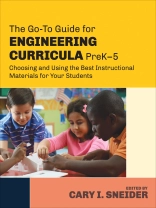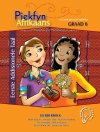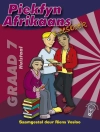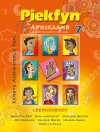How to engineer change in your elementary science classroom
With the implementation of the Next Generation Science Standards, your students won’t just be scientists—they’ll be engineers. But that doesn’t mean you need to reinvent the wheel. Respected science educator Cary Sneider has done the groundwork for you, collecting a full range of time-tested curriculum materials to seamlessly weave engineering and technology concepts into your math and science lessons.
In this volume, you’ll find descriptions of instructional materials specifically created for—and tested in—elementary science classrooms. Features include:
- A handy table that takes you straight to the chapters most relevant to your needs
- In-depth commentaries and illustrative examples that demystify engineering curricula at the Pre K-5 level
- A vivid picture of what each curriculum looks like in the classroom, the learning goals it accomplishes, and how it helps address the NGSS
- More information on the integration of engineering and technology into 21st-century science classrooms—and why it will make a difference
One of the most well-respected science educators in the country, Cary Sneider was an NGSS Writing Team Leader and is an associate research professor at Portland State University.
‘Knowledge and confidence to teach engineering in the elementary science curriculum comes with access to high quality instructional materials. Without question, this book provides the information teachers and curriculum specialists need to make well-informed decisions that will give students the opportunity to use the engineering design process to both apply and develop their knowledge of science. With elementary engineering in the STEM spotlight, this book is timely and much needed!’
-Page Keeley, Corwin Author and Science Education Consultant
‘Dr. Sneider’s book is a just-in-time, much needed resource for elementary teachers, administrators, and teacher educators. With the advent of the Next Generation Science Standards, many practicing elementary teachers are in great need of support. They need to know that there are high-quality, well-thought-out curricular options that they can use to scaffold engineering in their classrooms. This book provides exactly the introduction that they need. The curricula are thoroughly described, and the book includes everything that a teacher or an administrator needs to evaluate a curriculum for potential classroom use. This book is an extremely valuable tool in the quickly changing field of education.’
- Laura Bottomley, Directory, The Engineering Place
สารบัญ
Foreword – Janet Kolodner
Introduction – Cary Sneider
Technology and Engineering in Middle School Standards – Cary Sneider
Acknowledgments – Cary Sneider
1. Seeds of Science/Roots of Reading – Jacquey Barber
2. Physical Science Comes Alive! – Gary Benenson
3. Engineering by Design TEEMS: Kindergarten Through Second Grade – Diana Cantu
4. BSCS Science Tracks: Connecting Science & Literacy – Nancy Landes & Janet Carlson
5. A World in Motion From SAE International – Chris Ciuca
6. Engineering Opportunities in FOSS: The Full Option Science System, 3rd Edition – Linda De Lucchi & Laurence Malone
7. Engineering is Elementary: Engineering for Elementary School Students – Christine Cunningham
8. Tangible Kindergarten: Learning How to Program Robots in Early Childhood – Marina Bers
9. Engineering Adventures: Engineering for Out-of-School Time – Melissa Higgins
10. Engineering by Design TEEMS and I3 for Grades 3, 4, 5, and 6 – William Giese
11. Design It! Design Engineering Projects for Afterschool – Charlie Hutchison
12. Engineering for Everyone: 4-H′s Junk Drawer Robotics Curriculum – Steven Worker, Richard Majacek, Tara Wheeler, & Saundra Frerichs
13. Picture STEM – Tamara Moore & Kristina Tank
14. STEM in Action: Solar House Design – Elizabeth Gajdzik, Johannes Strobel, & Barbara Di Sioudi
เกี่ยวกับผู้แต่ง
Cary Sneider is Associate Research Professor in the Center for Science Education at Portland State University in Portland, Oregon, where he teaches research methodology to teachers in a Master’s degree program. In recent years he served the National Research Council as design lead for technology and engineering to help develop A Framework for K-12 Science Education: Practices, Crosscutting Concepts, and Core Ideas, which has provided the blueprint for Next Generation Science Standards (NGSS). He then played a similar role on the writing team to produce the NGSS, which was released in April, 2013. The recognition that teachers would need access to instructional materials to help them meet the new standards led Cary to develop the current volume, Engineering Curricula Ready to Go!Cary was not always interested in engineering—or at least he didn’t know that he was. For as long as he can remember he was interested in astronomy. He read all he could find about it, and when he was in middle school his father bought him a small telescope. In high school Cary built his own telescopes, grinding mirrors and designing and building mountings. All this time he thought he was doing science. Today, he recognizes that like many scientists, he especially enjoyed the engineering part of the work. During his junior year at college Cary had an opportunity to teach at an Upward Bound program, and found that he enjoyed teaching even more than research in astronomy. In subsequent years he taught science in Maine, Costa Rica, Coalinga California, and the Federated States of Micronesia. He returned to college, this time to obtain a teaching credential and eventually a Ph D degree in science education from the University of California at Berkeley. He spent nearly thirty years in Berkeley, developing instructional materials and running teacher institutes at the Lawrence Hall of Science. He spent another decade as Vice President at the Museum of Science in Boston, where he developed a high school curriculum called Engineering the Future, and finally moved to Portland, Oregon, to be closer to children and grandchildren. Over his career Cary directed more than 20 federal, state, and foundation grant projects, mostly involving curriculum development and teacher education. His R&D interests have focused on helping students and museum visitors unravel their misconceptions in science, on new ways to link science centers and schools to promote student inquiry, and on integrating engineering and technology education into the K-12 curriculum. In 1997 he received the Distinguished Informal Science Education award from NSTA and in 2003 was named National Associate of the National Academy of Sciences for his service on several National Research Council committees.












